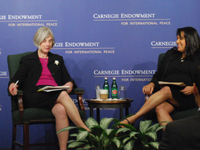Registration
You will receive an email confirming your registration.
Despite early predictions to the contrary, 172 participating countries agreed to concrete actions and reaffirmed their commitment to the nonproliferation regime at the conclusion of the 2010 Non-Proliferation Treaty (NPT) Review Conference, held at the United Nations in May. In a discussion facilitated by Carnegie’s Deepti Choubey, the U.S. Special Representative of the President for Nuclear Nonproliferation, Ambassador Susan Burk, provided her view of the proceedings and what should happen next.
U.S. Aims and the Final Outcome
According to Burk, the primary U.S. goal for the Conference was to reaffirm global support for the treaty through a balanced review of its three pillars: nuclear nonproliferation, disarmament, and peaceful uses of nuclear energy. She cited examples of progress toward that goal:
- Burk said the United States succeeded in securing “strong language” on safeguards, Treaty compliance, support for the International Atomic Energy Agency (IAEA), and President Obama’s step-by-step plan for nuclear disarmament.
- Participating countries adopted a consensus final document that included a 64-point action plan for disarmament, nonproliferation, peaceful uses of nuclear energy, and making progress toward a Middle East nuclear-weapons-free zone.
- The Review Conference needs to be interpreted in light of the difficulties of multilateral diplomacy, said Burk. Overall, she sees the outcome as a “glass half full.”
Iran’s Isolation
- Throughout the Conference, Iran remained a vocal critic of the United States and other states that were proposing tougher nonproliferation measures. Choubey stated that many in New York interpreted Iran’s tactics as part of an effort to delay substantive progress.
- Although Iran consented to the Conference final document, Burk said it was the “last state” to sign on. Burk added that many of Iran’s criticisms of the United States and other unnamed nuclear-weapons states resonated with some Conference participants.
- Condemning Iran explicitly in the final document text would have been extremely difficult, Burk concluded, because Review Conferences traditionally operate on consensus, which Iran could have blocked.
Middle East Nuclear-Weapons-Free Zone
- At the 1995 Review Conference, NPT member states resolved to take “practical steps…aimed at making progress toward” a Middle East free of nuclear weapons. Making progress on this resolution at the 2010 Conference was a top priority for Egypt.
- The 2010 final document calls for holding a conference in 2012 on establishing such a zone.
- The United States supports the resolution, but is concerned that the reference in the final document to Israel, which has not signed the NPT, could “jeopardize the prospects of everyone attending.”
